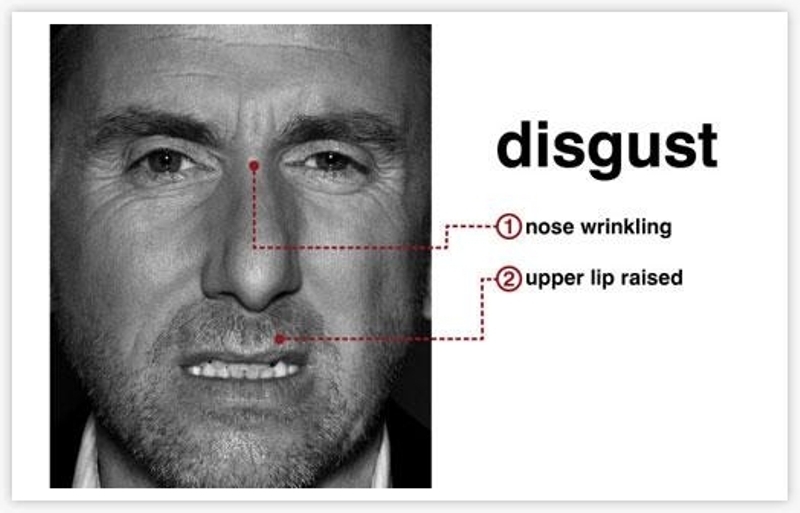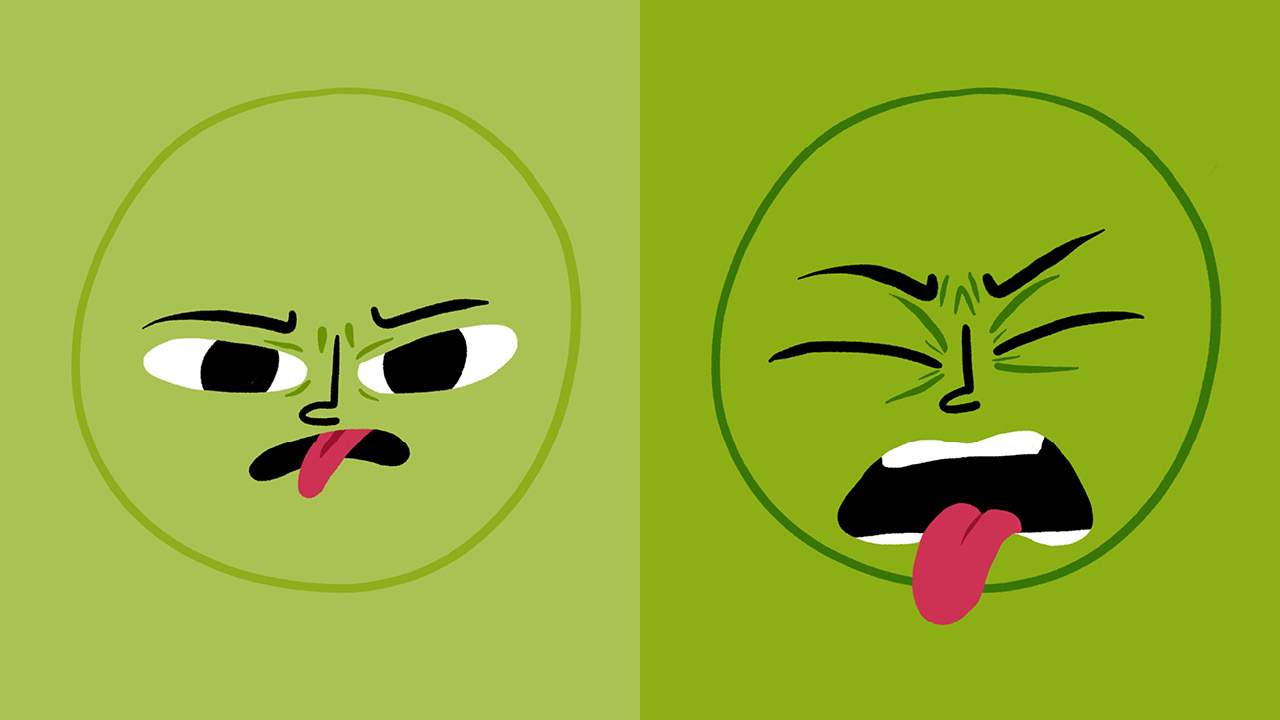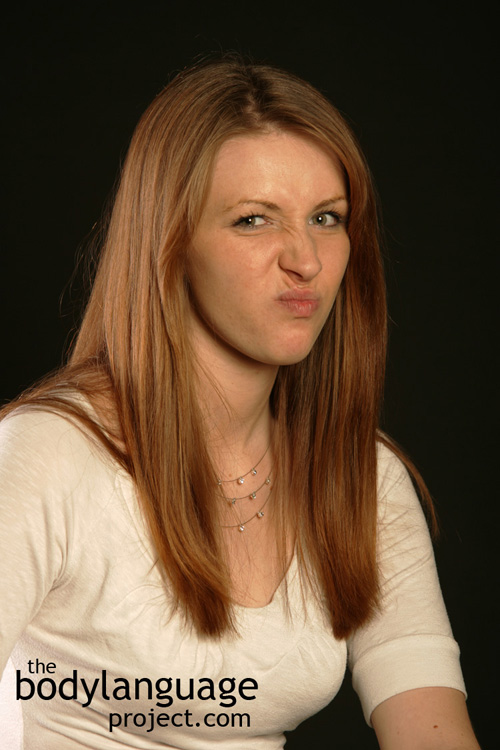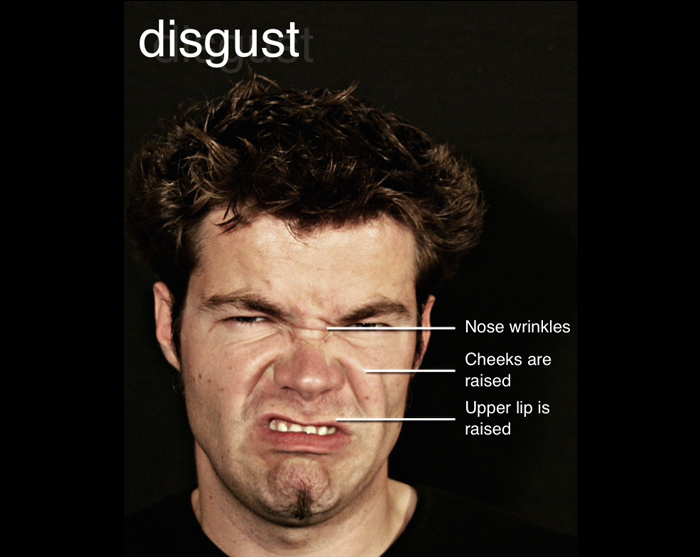
Body Language Decoded Understanding body language 7 basic facial emotions
A microexpression is a very brief, involuntary facial expression humans make when experiencing an emotion. They usually last 0.5-4.0 seconds and cannot be faked. What is microexpression training? Who invented the microexpression? Are there universal emotions? How do I read microexpressions? They can occur as fast as 1/15 to 1/25 of a second.

Royalty Free Disgust Pictures, Images and Stock Photos iStock
Facial expressions: Disgust and contempt by Hanan Parvez Eyebrows In extreme disgust, the eyebrows are lowered forming a 'V' above the nose and producing wrinkles on the forehead. In mild disgust, the eyebrows may only be slightly lowered or not lowered at all. Eyes Eyes are made as narrow as possible by bringing the eyelids together.

Facial expressions Disgust
The emotion attributed to the prototypical "facial expression of disgust" (a nose scrunch) depended on what facial expressions preceded it. In two studies, the majority of 120 children (5-14 years) and 135 adults (16-58 years) judged the nose scrunch as expressing disgust when the preceding set included an anger scowl, but as angry when the anger scowl was omitted. An even greater.

Facial expressions Disgust PsychMechanics
In order to evaluate the children's performances, children were asked to identify the emotion conveyed in each of the 42 photographs of actors (7 emotions x 3 stimulus types x 2 genders) representing facial expressions. Each image showed one of the six basic emotions (i.e., happiness, sadness, anger, disgust, surprise, fear) or a neutral.

301 Moved Permanently
The emotion attributed to the prototypical "facial expression of disgust" (a nose scrunch) depended on what facial expressions preceded it. In two studies, the majority of 120 children (5-14 years) and 135 adults (16-58 years) judged the nose scrunch as expressing disgust when the preceding set incl.

The 6 Basic Emotions Animating Disgust with Jay Davis Animation Mentor Blog
Remarkably, the opposite facial expression to fear turned out to be very much like disgust, and vice versa, even to the eyes of impartial observers. A fearful expression is effectively the.

Two Women Expressing Disgust Disapproval Stock Footage SBV317303951 Storyblocks
Background and objectives Facial expression recognition has been studied extensively, including in relation to social anxiety. Nonetheless, a limited number of studies examined recognition of disgust expressions. Results suggest that disgust is perceived as more threatening than anger, and thus may invite more extreme responses. However, few studies have examined responses to facial.

THIS is How to Read Emotions from Another Person's Eyes! David Avocado Wolfe
Facial inferencing research began with an inadvertent confound. The initial work by Paul Ekman and Wallace Friesen identified the six now-classic facial expressions by the emotion labels chosen by most participants: anger, disgust, fear, happiness, sadness, and surprise. These labels have been used by most of the published facial inference research studies over the last 50 years.

Day 14 // How to Draw a Disgusted Expression • Bardot Brush
The 7 Universal Facial Expressions Research by Dr. Paul Ekman tells us that there are seven universal facial expressions that we all use, even across cultural divides. These expressions show: Anger Contempt Disgust Fear Happiness Sadness Surprise

Facial Expressions The Only Book On Body Language That Everybody Needs To Read
Facial expressions are both universal and culture-specific. Dr. Ekman discovered strong evidence of universality * of some facial expressions of emotion as well as why expressions may appear differently across cultures.. Disgust is the correct facial expression. In this photograph, the subject was asked to show what his face would look like.

Your brain's response to disgust can predict your political worldview, says new study ExtremeTech
Something rotting, diseased or dying Injuries, surgeries and/or being exposed to bodily insides A person, animal or thing one considers physically ugly Perceived perversions or actions of other people (such as certain sexual inclinations, torture or servitude) Development of disgust

Micro Expression The facial expressions of the 7 basic emotions at a glance › Pantomime Popkultur
Researchers disagree over the specific action units that change with the disgust facial expression. Darwin suggested four specific changes in facial muscles (see Table 7), while Ekman and Friesen (1978) emphasized three specific action units. In general, researchers agree that the gape, retraction of upper lip, and nose wrinkle all represent.

Young woman with a disgusting face — Stock Photo 51954741
Yet despite the complexity of the human face, which has 43 muscles in all, most of existing facial expression research focuses on six "basic" emotions: happiness, surprise, sadness, anger, fear.

Le espressioni facciali come agiscono su marketing e comunicazione
Facial Expressions © Verywell, 2017 Think for a moment about how much a person is able to convey with just a facial expression. A smile can indicate approval or happiness. A frown can signal disapproval or unhappiness. In some cases, our facial expressions may reveal our true feelings about a particular situation.

‘That’s disgusting!’ What ‘Inside Out’ teaches us about disgust.
Facial expression recognition has been studied extensively, including in relation to social anxiety. Nonetheless, a limited number of studies examined recognition of disgust expressions. Results suggest that disgust is perceived as more threatening than anger, and thus may invite more extreme responses.

disgusted expression Google Search Expressions photography, Face expressions, Facial
After the initial onset of surprise, an expression may merge into fear, anger, disgust, disappointment, or something else, depending upon what triggered the surprise. If the event was not exceptional, we might feel boredom, contentment, or nothing after the surprise has worn off. Sadness